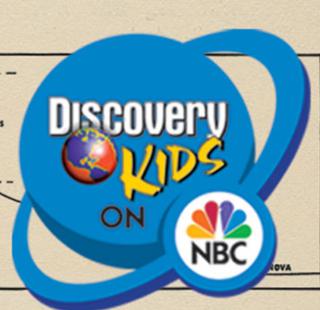Related Research Articles

The National Broadcasting Company (NBC) is an American commercial broadcast television and radio network serving as the flagship property of the NBC Entertainment division of NBCUniversal, a subsidiary of Comcast. The headquarters of NBC is in New York City at the Comcast Building. NBC also has offices in Chicago at the NBC Tower.

Ion Television is an American broadcast television network and FAST television channel owned by the Scripps Networks subsidiary of the E. W. Scripps Company. The network first began broadcasting on August 31, 1998, as Pax TV, focusing primarily on family-oriented entertainment programming. It rebranded as i: Independent Television on July 1, 2005, converting into a general entertainment network featuring recent and older acquired programs. The network adopted its identity as Ion Television on January 29, 2007.

ABC Kids was an American Saturday morning children's programming block that aired on ABC from September 13, 1997 to August 27, 2011. It featured a mixture of animated and live-action series from Walt Disney Television Animation and Disney Channel, aimed at children between the ages of 6 and 14. This was the only time Disney Channel content aired on over-the-air television in the United States.

Disney's One Too was an American two-hour Sunday-to-Friday children's programming block that aired on UPN from September 6, 1999 to August 31, 2003. A spin-off of the Disney's One Saturday Morning block on ABC, it featured animated series from Disney Television Animation aimed at children between the ages of 6 and 11.

TNBC is the name of a former American teen-oriented television programming block that aired on NBC from September 12, 1992 to September 28, 2002, due to its replacement with the children's-oriented Discovery Kids on NBC educational lineup. The Saturday morning block featured comical live-action series – primarily in the form of scripted sitcoms and variety series such as Saved by the Bell, California Dreams, Hang Time, One World, City Guys and others – geared toward teenagers and sometimes young adults, the majority of which were produced by such key people as Peter Engel and the network's in-house production units NBC Studios and NBC Enterprises.

Discovery Kids on NBC was an American children's programming block that aired on NBC from October 5, 2002 to September 2, 2006. The block was produced under a time-lease agreement with Discovery Kids, and features a mixture of live-action and animated series originated on the cable network that met educational programming requirements defined by the Federal Communications Commission.
A weekday cartoon is the colloquial term for the animated series programming that was typically scheduled on weekday mornings and afternoons in the United States on many major television networks and in broadcast syndication since the 1960s.

Qubo was an American television network for children between the ages of 5 and 14. Owned by Ion Media, it consisted of a 24-hour free-to-air television network often mentioned as the "Qubo channel", associated website with games and programs available through video on demand, and a weekly programming block on Ion Television, along with Ion Life, later known as Ion Plus.
Saturday morning preview specials were aired on television annually to present previews of each network's fall lineup of Saturday-morning cartoon children's programming. Similar to the model for their new prime time counterpart shows, television networks in the United States and Canada would film a preview special for the fall season. These would often air as part of the regular network schedule, or be made available to their affiliates for airing at any time, especially to fill timeslots which contained programming canceled months before.
Toonturama is an American children's programming block that airs on the Spanish-language television network UniMás which debuted on January 15, 2002 and January 19, 2002. The four-hour block—which airs Saturday and Sunday mornings from 7:00 a.m. to 11:00 a.m. Eastern Time and Pacific Time—features live action and animated series aimed at children between the ages of 2 and 14. It was the network's attempt to have a Saturday morning block.
In regard to children's television programming, CBS has aired mostly animated series, such as the original versions of Scooby-Doo, Fat Albert and the Cosby Kids, Jim Henson's Muppet Babies, Garfield and Friends and the 1987 incarnation of Teenage Mutant Ninja Turtles. This article outlines the history of children's television programming on CBS including the various blocks and notable programs that have aired throughout the television network's history.
In regard to children's programming, the American Broadcasting Company (ABC) has aired mostly programming from Walt Disney Television or other producers. This article outlines the history of children's television programming on ABC including the various blocks and notable programs that have aired throughout the television network's history.
The broadcast of educational children's programming by terrestrial television stations in the United States is mandated by the Federal Communications Commission (FCC), under regulations colloquially referred to as the Children's Television Act (CTA), the E/I rules, or the Kid Vid rules. Since 1997, all full-power and Class A low-power broadcast television stations have been required to broadcast at least three hours per-week of programs that are specifically designed to meet the educational and informative (E/I) needs of children aged 16 and younger. There are also regulations on advertising in broadcast and cable television programming targeting children 12 and younger.

NBC Kids was an American Saturday morning children's television programming block that aired on NBC from July 7, 2012 to September 25, 2016. Telemundo also aired a version of the block under the "MiTelemundo" title, which featured a separate lineup of Spanish-dubbed programs until December 31, 2017. NBC Kids, which replaced the Qubo block, was programmed by the other Sprout preschool cable network, as they were both targeted at children ages 2 to 6.

The More You Know (TMYK) is an American programming block that is programmed by Hearst Media Production Group, and debuted on October 8, 2016, as a replacement for the animation block NBC Kids. It airs on weekend mornings on NBC and Telemundo, and is replayed Sunday mornings on sister network Cozi TV. The block's programs are also available through all of NBC's video on demand venues, including the network's site/app, Peacock, and cable/satellite services.

Universal Kids is an American children's television channel owned by the NBCUniversal Media Group division of NBCUniversal, which is a wholly owned subsidiary of Comcast.
Children's programming has played a part in Telemundo's programming since its initial roots in television. This article outlines the history of children's television programming on Telemundo including the various blocks and notable programs that have aired throughout the television network's history.

Telemundo Kids is a former American children's programming block that debuted on October 6, 2001 on the Spanish-language television network Telemundo. The three-hour block—which aired on Saturday and Sunday mornings from 7:00 a.m. to 10:00 a.m. Eastern Time and Pacific Time—featured live action and animated series aimed at children between the ages of 2 and 14.
The 2021–22 morning network television schedule for the five major English-language commercial broadcast networks in the United States covers the weekday and weekend morning hours from September 2021 to August 2022. The schedule is followed by a list per network of returning and cancelled shows from the 2020–21 season. The daytime schedules for the five major networks that offer morning programming are expected to remain consistent with the prior television season.
References
- ↑ Holz, Jo (2017). Kids' TV Grows Up: The Path from Howdy Doody to SpongeBob. Jefferson, NC: McFarland. ISBN 978-1-4766-6874-1.
- 1 2 Bernstein, Paula (December 4, 2001). "Discovery set to kid around with Peacock". Variety . Reed Business Information . Retrieved August 13, 2009.[ permanent dead link ]
- ↑ "Adults 'Discover' kiddie programs". Variety. Reed Business Information. 2003. Retrieved March 29, 2015.
- ↑ Oei, Lily (April 2, 2002). "Discovery Kids sets NBC sked". Variety. Reed Business Information. Retrieved March 29, 2015.
- ↑ Umstead, Thomas (December 7, 2001). "Discovery Gets NBC Kids' Block". Multichannel News . Retrieved March 29, 2015.
- ↑ Oei, Lily; McClintock, Pamela (November 6, 2003). "Kids mixed on new skeds". Variety. Retrieved March 29, 2015.
- ↑ Oei, Lily (August 24, 2003). "Nets face back to school blues". Variety. Reed Business Information. Retrieved March 29, 2015.
- ↑ Riddell, Robert (March 19, 2006). "Discovery Kids parts with NBC". Variety. Reed Business Information. Retrieved March 29, 2015.
- ↑ Crupi, Anthony (March 16, 2006). "Discovery, NBC to End Sat. Kids Block". Mediaweek. Archived from the original on February 7, 2008. Retrieved March 25, 2008.
- ↑ Hampp, Andrew (August 24, 2006). "NBC Debuts Kids Programming Brand Qubo". Advertising Age . Retrieved March 29, 2015.
- ↑ Clemens, Luis (February 16, 2008). "Qubo's Rodriguez: Offering a 'Building Block' to Kids". Multichannel News. Retrieved March 29, 2015.
- ↑ "God references quashed; 'VeggieTales creator steamed". CNN . Associated Press. September 22, 2006. Archived from the original on October 4, 2006. Retrieved June 22, 2009.
- ↑ Weisman, Jon (March 28, 2012). "NBC to launch Saturday kids block". Variety. Penske Media Corporation. Archived from the original on May 19, 2012. Retrieved March 27, 2015.
- ↑ Rubino, Lindsay (March 28, 2012). "NBC, With Assist From Sprout, to Launch Saturday Morning Preschool Block". Multichannel News. Retrieved March 27, 2015.
- ↑ "NBC Will Launch NBC Kids, a New Saturday Morning Preschool Block Programmed by Sprout®, Saturday, July 7". MarketWatch . March 28, 2012. Retrieved March 27, 2015.
- ↑ "NBC AND LITTON ENTERTAINMENT EXPAND ICONIC 'THE MORE YOU KNOW' PLATFORM INTO NEW THREE-HOUR SATURDAY MORNING PROGRAMMING BLOCK" (Press release). Retrieved February 24, 2016.
- ↑ "NBC, Litton Partner on 'The More You Know' Block". Broadcasting & Cable. NewBay Media . Retrieved February 24, 2016.